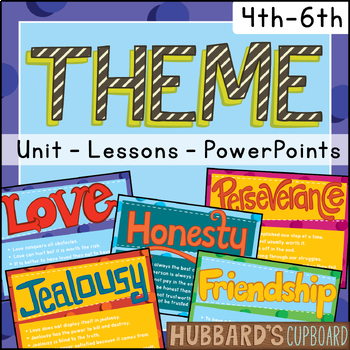Teaching Theme Statements in Literature - Find and Determine Theme Worksheets
- Zip
- Google Apps™

What educators are saying
Description
Finding theme in literature is a difficult skill to master. This unit breaks down the skill into 6 lessons that are scaffolded. It includes lesson plans, passages, printouts, and tasks that assess each learning target. It is so thorough that the teacher will need little prep time. The unit also comes equipped with beautiful classroom posters which include theme statements and that can be used long after the unit is taught.
Check out our other ELA Units:
Note: This unit includes the ★ Theme Posters ★ that are sold separately in our store for $5.00. You get the lesson plans, ppts., and posters with this unit.
Purpose of Unit
We created this unit because determining theme and identifying theme of fiction stories is such an abstract concept to teach upper elementary and middle school students. When looking for lessons, it seemed they were either oversimplified or not correct. We wanted to create a unit that taught it correctly from the CCRA RL.2. Instead of teaching it as one word like “love” or “friendship”, we designed the unit to teach theme as a message or a theme statement like “Love is a powerful force that overcomes many obstacles”.
Unit Includes:
- 6 very detailed, chunked lesson plans with ppts. that include everything a teacher needs
- Independent tasks for each lesson plan that serve as a formative assessment for learning target
- Stories that students will practice the skill of determining theme.
- Samples for each lesson
- “I Can” Statements and Essential Questions
- Learning Scales and Student Tracking Sheet
- Summative assessment that asks questions about each learning target.
The unit will work for 4th graders to 7th graders. For the younger students, teachers will need to teach more explicitly. This unit would be a great tool for small groups. For the older students, this unit will work well for independent work. This would also be a great tutoring resource for students struggling with theme because of the way it is chunked into bite-size lessons.
Chunked Learning Targets
- Identify the differences between the subject, main idea, and theme of a story.
- Determine the main subject of a story from a list and determine if the tone is positive or negative.
- Create a new subject and theme of a story by changing the character’s traits and plot events in a story.
- Analyze a theme statement to determine if it is universal.
- Determine and Identify a theme by using a strategy called “TEST” which analyzes traits, events, subject, and tone of a story.
- Use a theme to prewrite a story and then write a story that teaches a theme.
Enjoy!
Hubbard's Cupboard





